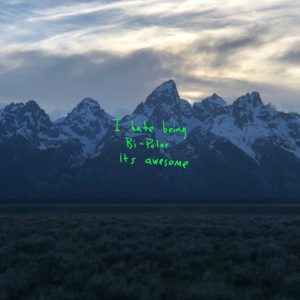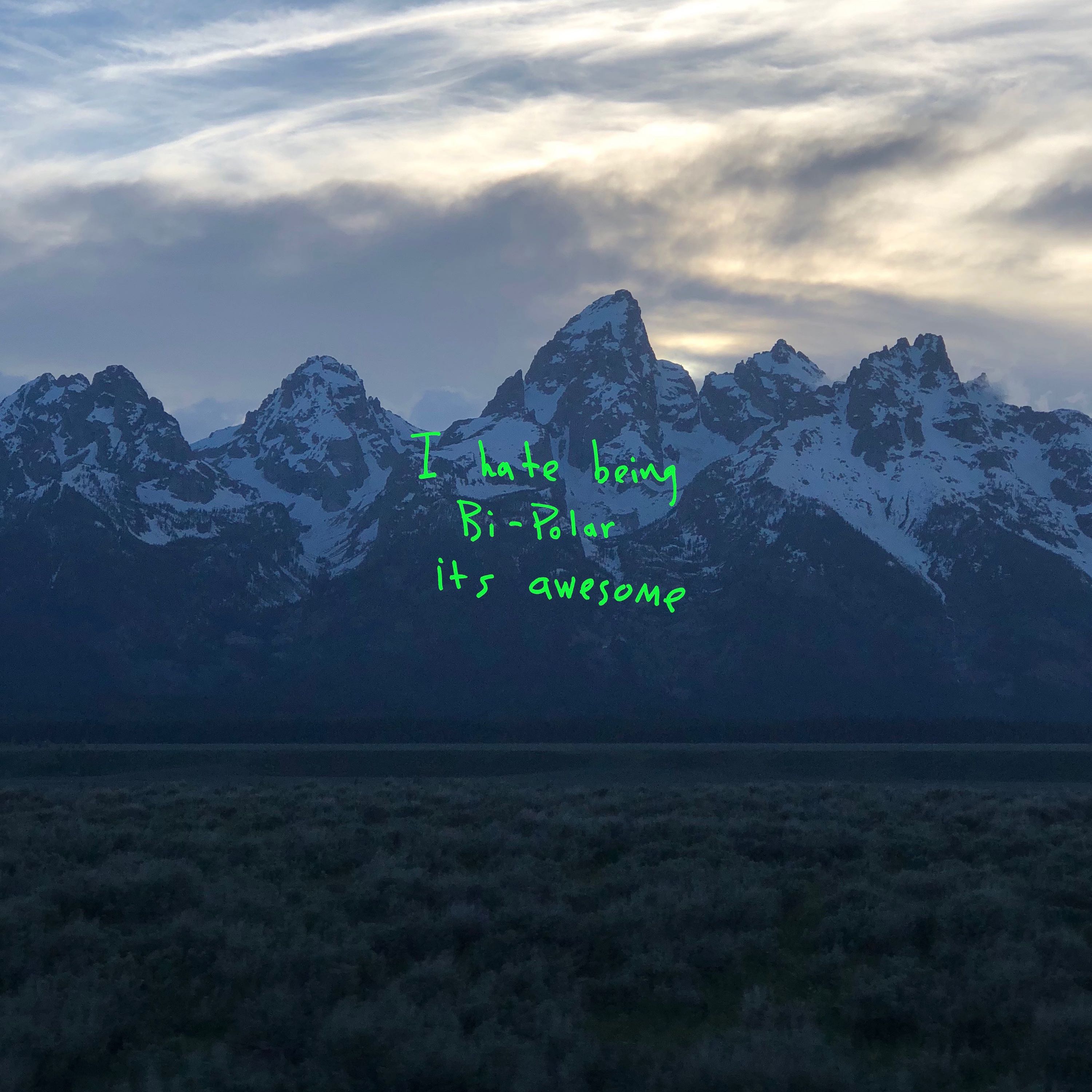 Kanye West
Kanye West
ye
G.O.O.D./DEF JAM
5/10
For Kanye West, every day is transactional. Not in a quasi-religious sense, each morning optimistically bargaining with a greater power for a brighter day, but with a mindset that confronts reality much more bleakly, as if life is nothing more than an agreement between two entities. It wasn’t always like this—maybe he’s somehow lost the kind of creative empathy that made My Beautiful Dark Twisted Fantasy flourish, even if what he was writing about in 2010 hasn’t changed much in 2018. Or maybe it’s just us, and the contractual relationship we’ve enjoyed for fifteen years with West, famous genius, has soured. He’s finally asked too much of us, the World, and when we admit that, we reify his toxic belief that if no one understands him, then he must be a genius.
“If you tweakin’ out on my texts again / Then I don’t get reception here”: West’s lyrics are littered with conditional if-then statements, bent desperately on them. On “Father Stretch My Hands, Pt. 1,” he suddenly flipped the ecstasy of “Ultralight Beam” into a gross moment of self-reflection: “If I fuck this model / And she just bleached her asshole / And I get bleach on my T-shirt / I’ma feel like an asshole.” With The Life of Pablo, West had yet to say out loud that slavery was a “choice,” so his logic—“if” this happens, “then” all my feelings, no matter how repugnant, are validated—represents a fascinating artist exploring the contradictions of his image. If you put up with me, I’ll give you something worth the effort.
But with ye, the result of a supposed feverish month of creation exposed at an exclusive listening party in the Wyoming countryside that adorns the album cover, his solipsism is complete. “Even if, publicly, I lack the empathy / I ain’t finna talk about it, ’nother four centuries,” West tells someone, maybe his wife, on his treacly “gentle mental” confessional “Wouldn’t Leave.” He doesn’t owe his wife any more of an explanation for his behavior than he’s already given her, just as he doesn’t feel like he owes any of us an explanation for all the dangerous faux pas he’s been spouting. The rest of the voices on the track lean back with identical self-satisfaction, PARTYNEXTDOOR crooning as if he’s taunting us on the vast, middle American, middle-of-nowhere schoolyard where Kanye West does what Kanye West wants. Jeremih is also here.
On his eighth solo album, Kanye West sets the standard by which ye must be judged, announcing a brisk five-album release schedule as evidence of his brilliant Kerouacian spirit. Everything on his terms, he reminds us (“Let me make this clear, so all y’all see / I don’t take advice from people less successful than me”), so we accept ye, even though it is West’s worst, an exceptionally mediocre album. Still, if we didn’t accept ye, he wouldn’t know the difference (unless he and Kim Kardashian lost a lot of money, but that won’t happen). We accept the lackluster slam poetry of “I Thought About Killing You” and we even don’t seem to mind that he never cleared the Kareem Lofty sample, or that his precision as a producer—perhaps the only thing about his career that’s matured—means this would be a warmer song were it wordless. “If I was tryin’ to relate it to more people / I’d probably say I’m struggling with loving myself,” he explains, knowing he wouldn’t mean it, because we accept how powerfully Kanye West loves himself.
We accept the bland baseness of “Yikes,” because West warned us as much. We accept Kid Cudi and West singing off-key, because at least there is a concept to “Ghost Town,” a hint of a deeper idea, a prelude to an upcoming album we know will exist, clinging to some semblance of a discernible future in the endless, annoying noise of being a Kanye West fan. We accept the twisted misogyny of “Violent Crimes,” and perhaps swoon a bit at 070 Shake’s warble, letting the whispering synth soften our cynicism, because at least West seems to care about someone, a daughter, whichever daughter, whom he objectifies by comparing her physically to his wife, her mother.
Whatever structure ye maintains, whatever exigencies of fame and fortune Kanye West lays bare, however offensively he compares mental illness to having super powers (followed by a tone-deaf shriek, a Miley Cyrus–like bleat of cray-cray ignorance), we must also accept that all of Kanye’s antics and bastardized notions of performance art amounted to nothing. A hollow document and a dumb spectacle, ye is the work of an artist who’s maybe been bargaining with no one but himself this whole time.









